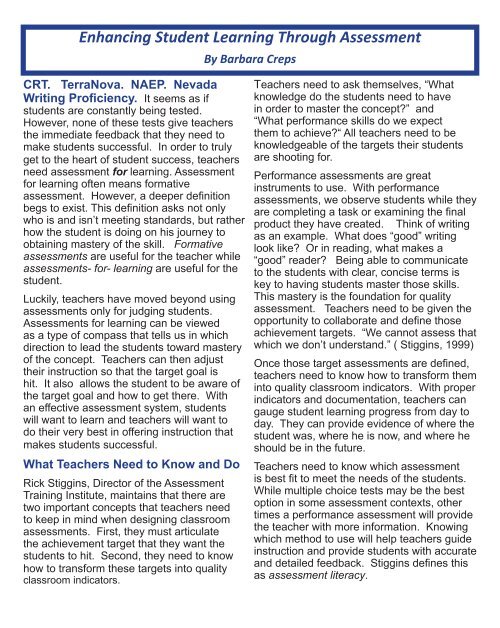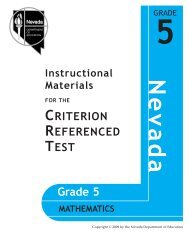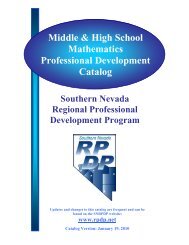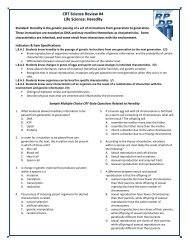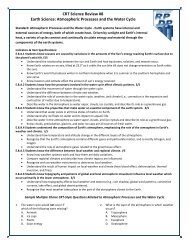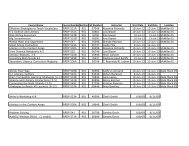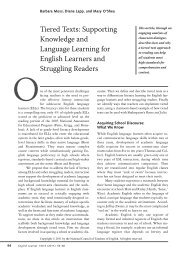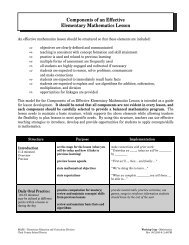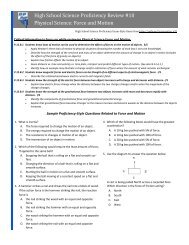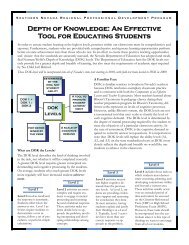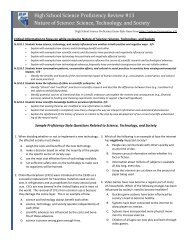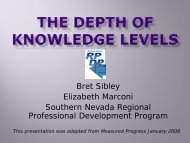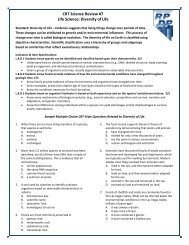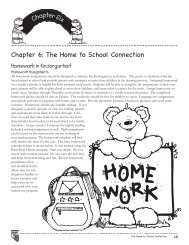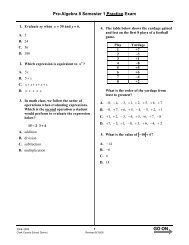Download - RPDP
Download - RPDP
Download - RPDP
You also want an ePaper? Increase the reach of your titles
YUMPU automatically turns print PDFs into web optimized ePapers that Google loves.
Enhancing Student Learning Through Assessment<br />
By Barbara Creps<br />
CRT. TerraNova. NAEP. Nevada<br />
Writing Proficiency. It seems as if<br />
students are constantly being tested.<br />
However, none of these tests give teachers<br />
the immediate feedback that they need to<br />
make students successful. In order to truly<br />
get to the heart of student success, teachers<br />
need assessment for learning. Assessment<br />
for learning often means formative<br />
assessment. However, a deeper definition<br />
begs to exist. This definition asks not only<br />
who is and isn’t meeting standards, but rather<br />
how the student is doing on his journey to<br />
obtaining mastery of the skill. Formative<br />
assessments are useful for the teacher while<br />
assessments- for- learning are useful for the<br />
student.<br />
Luckily, teachers have moved beyond using<br />
assessments only for judging students.<br />
Assessments for learning can be viewed<br />
as a type of compass that tells us in which<br />
direction to lead the students toward mastery<br />
of the concept. Teachers can then adjust<br />
their instruction so that the target goal is<br />
hit. It also allows the student to be aware of<br />
the target goal and how to get there. With<br />
an effective assessment system, students<br />
will want to learn and teachers will want to<br />
do their very best in offering instruction that<br />
makes students successful.<br />
What Teachers Need to Know and Do<br />
Rick Stiggins, Director of the Assessment<br />
Training Institute, maintains that there are<br />
two important concepts that teachers need<br />
to keep in mind when designing classroom<br />
assessments. First, they must articulate<br />
the achievement target that they want the<br />
students to hit. Second, they need to know<br />
how to transform these targets into quality<br />
classroom indicators.<br />
Teachers need to ask themselves, “What<br />
knowledge do the students need to have<br />
in order to master the concept?” and<br />
“What performance skills do we expect<br />
them to achieve?“ All teachers need to be<br />
knowledgeable of the targets their students<br />
are shooting for.<br />
Performance assessments are great<br />
instruments to use. With performance<br />
assessments, we observe students while they<br />
are completing a task or examining the final<br />
product they have created. Think of writing<br />
as an example. What does “good” writing<br />
look like? Or in reading, what makes a<br />
“good” reader? Being able to communicate<br />
to the students with clear, concise terms is<br />
key to having students master those skills.<br />
This mastery is the foundation for quality<br />
assessment. Teachers need to be given the<br />
opportunity to collaborate and define those<br />
achievement targets. “We cannot assess that<br />
which we don’t understand.” ( Stiggins, 1999)<br />
Once those target assessments are defined,<br />
teachers need to know how to transform them<br />
into quality classroom indicators. With proper<br />
indicators and documentation, teachers can<br />
gauge student learning progress from day to<br />
day. They can provide evidence of where the<br />
student was, where he is now, and where he<br />
should be in the future.<br />
Teachers need to know which assessment<br />
is best fit to meet the needs of the students.<br />
While multiple choice tests may be the best<br />
option in some assessment contexts, other<br />
times a performance assessment will provide<br />
the teacher with more information. Knowing<br />
which method to use will help teachers guide<br />
instruction and provide students with accurate<br />
and detailed feedback. Stiggins defines this<br />
as assessment literacy.


